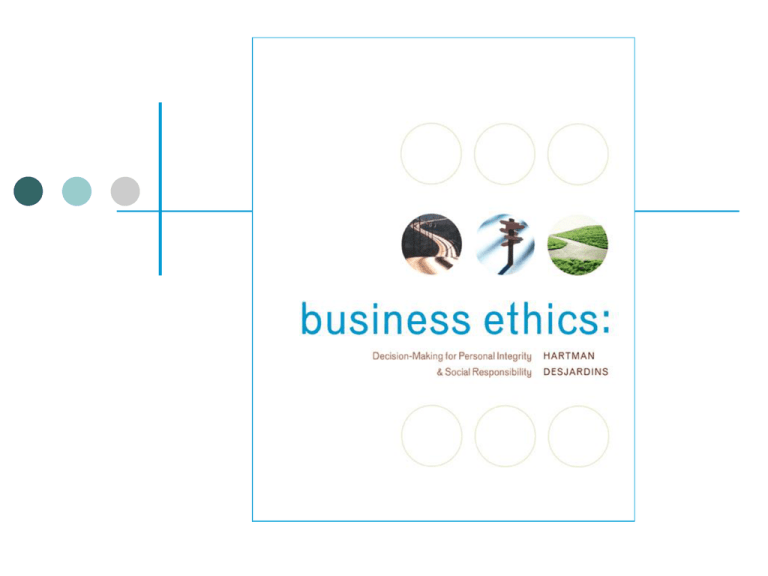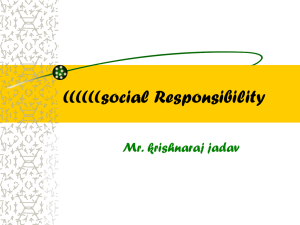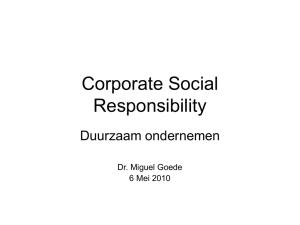
Chapter
5
Corporate Social Responsibility
McGraw-Hill/Irwin
Business Ethics: Decision-Making for Personal Integrity
& Social Responsibility
Copyright © 2008
5-2
1-2
The McGraw-Hill Companies, Inc. All rights reserved.
Chapter Objectives
After exploring this chapter, you will be able to:
1. Define corporate social responsibility
2. Discuss the three models of CSR
3. Discuss the challenge in identifying the object of a corporation’s
responsibility.
4. Distinguish key components or elements of the term
“responsibility”
5. Explain the role of reputation as one possible motivation behind
CSR
6. Evaluate the claims that CSR is “good” for business
5-3
1-3
Defining “Corporate Social
Responsibility”
In general terms, CSR encompasses the responsibilities that
businesses have to the societies within which these businesses
operate.
The European Commission defines CSR as “a concept
whereby companies decide voluntarily to contribute to a
better society and a cleaner environment.”
Specifically, CSR suggests that a business identify its
stakeholder groups and incorporate their needs and values
within its strategic and operational decision-making process.
5-4
1-4
Why do it?
Three Models by which to Define
Advocates for CSR have several bases for their contentions that a
business should go above and beyond the maximization of profits or
at least that CSR activities contribute to that objective.
The models for CSR are based in both ethics (“citizenship”) and
economics, and the language used in each tends to vary.
Not meant to be exclusionary nor all-encompassing; they simply
assist us in discussing areas of differentiation.
5-5
1-5
The Corporate Citizenship
Model of CSR
Some companies engage in CSR efforts solely for the public good and do
not expect a commercial return on their contributions.
These organizations believe that they play a particular role in the
community and that their ability to do good – which derives from the
profits they reap – creates a responsibility to do good.
This model often exists where there is a strong leader with a sense of
responsibility and connection to the community.
Example: in Ben & Jerry’s Ice Cream most recent Social &
Environmental Assessment, the company explains that it seeks to create a
“broader, bolder vision of how it can leverage its reputation and its
expertise to advance its Social Mission.”
5-6
1-6
The Social Contract Model of
CSR
Second, some CSR proponents argue that corporations reap
the benefits of serving as a community citizen and therefore
owe a reciprocal obligation to that community.
This model holds that the moral rights possessed by various
stakeholders create responsibilities on the part of the
corporation to respect those rights.
5-7
1-7
The Enlightened Self-Interest
Model of CSR
States that the incorporation of CSR can lead to differentiation and
competitive market advantage for the business, something that can be
branded for the present and future. (Also sometimes termed the economic
model)
Some companies have implemented a strong CSR policy and have been
successful in the establishment of a positive brand. Examples: BP and
Nike.
In a 2005 announcement about an increase in funding for green technology
research, General Electric CEO Jeffrey Immelt explained that it was not a “selfsacrificing attempt to save the planet,” but instead because GE planned “to make
money doing it.”
Under this larger economics umbrella, one would find arguments based in
reduction of risk, market reputation, brand image, stakeholder
relationships, and long term strategic interests.
5-8
1-8
To whom does business owe this
social responsibility?
Firms exist in relationships with many stakeholders and these
relationships can create a variety of responsibilities.
It may not be possible to satisfy the needs of each and every
stakeholder in a situation.
Therefore, social responsibility would require decisions to
prioritize competing and conflicting responsibilities.
5-9
1-9
The Nature and Extent of the
Responsibility
Is profit, legally made, the only guiding principle of socially
responsible business activities, or should the impact of a
decision on others be considered, even where the law does not
require it?
What do we mean when we say “responsible?”
We might mean that it is reliable, dependable or trustworthy.
A second meaning of responsible involves attributing something
as a cause for some event or action.
A third sense involves attributing liability or accountability for
some event or action and creates a responsibility to make things
right again.
5-10
1-10
The Nature of “Responsibility”
Reference to corporate social responsibility denotes those duties or
restrictions that bind us to act in one way rather than another.
Responsibilities are those things that we ought, or should, do, even if we
would rather not.
Responsibilities bind, or compel, or constrain, or require us to act in
certain ways.
To talk about business’s social responsibilities is to be concerned with
society’s interests that restrict or bind business’s behavior.
Social “responsibility” is what a business
should or ought to do for the sake of society.
5-11
1-11
Corporate “Responsibilities”
Even when not explicitly prohibited by law, ethics would
demand that we not cause avoidable harm. In practice, this
ethical requirement is very close to responsibilities
established by the precedents of tort law.
Beyond the responsibility to obey the law, a second level of
responsibilities would hold that business has a social
responsibility not to violate anyone’s rights.
But there are also cases in which business is not causing
harms, but could easily prevent harms from occurring. A
more inclusive understanding of corporate social
responsibility would hold that business has a responsibility
to prevent harms.
5-12
1-12
A Responsibility
to “Do Good?”
Perhaps the most wide-ranging standard of CSR would hold
that business has a social responsibility to do good things and
to make society a better place.
Many of the debates surrounding corporate social
responsibility involve the question of whether business really
has a responsibility to support such good causes.
Some people argue that, like all cases of charity, this is something
that deserves praise and admiration, but it is not something that
every business ought to do.
5-13
1-13
A Responsibility
to “Do Good?”
Philosophers sometimes distinguish between
obligations/duties and responsibilities to make exactly this
point.
We may have a responsibility to be charitable, but it is not
obligatory nor is it a duty.
Others argue that business does have an obligation to support good
causes and “give back” to the community.
This sense of responsibility is more akin to a debt of gratitude
and thankfulness; something less binding than a legal or
contractual obligation perhaps, but more than a simply act of
charity.
5-14
1-14
Exploring Enlightened SelfInterest: Motivation for CSR
There are a variety of arguments to motivate a socially responsible firm.
The impact on the bottom line may stem both from customer preference
as well as from employee preference.
The problem with a focus on preference, however, is that social
responsibility becomes merely social marketing.
A firm may use the image of social responsibility to garner customer
support or employee loyalty while the facts do not evidence a true
commitment.
Are motivations relevant? Can a firm
have only one motivation?
5-15
1-15
Does Motivation Matter?
The practice of caring for the “image” of a firm is sometimes referred to
as reputation management.
There is nothing inherently wrong with managing one’s firm’s reputation,
but observers might challenge firms for engaging in CSR activities solely
for the purpose of impacting their reputations.
The challenge is based on the fact that reputation management often
works!
If a firm creates a good image for itself, it builds a type of trust bank
where consumers or other stakeholders seem to give it some slack if they
then hear something negative about the firm.
Similarly, if a firm has a negative image, that image may stick, regardless
of what good the corporation may do.
5-16
1-16
Does Good Ethics = Good
Business?
Let us take a look at the evidence – It is somewhat
persuasive but one needs to weigh it for one’s self.
David Vogel contends that, while there is a market for firms
with strong CSR missions, it is a niche market and one that
therefore caters to only a small group of consumers or investors.
SustainAbility concludes “it does pay!” The report concludes
that it does pay for businesses in emerging markets to pursue a
wider role in environmental and social issues, citing cost
reductions, productivity, revenue growth, and market access as
areas of greatest return for MNEs.
5-17
1-17
Records on Social Issues =
Positive Financials
Moreover, a landmark study by Professors Stephen Erfle and
Michael Frantantuono found that firms that were ranked
highest in terms of their records on a variety of social issues
(including charitable contributions, community outreach
programs, environmental performance, advancement of
women, and promotion of minorities) had greater financial
performance as well.
Financial performance was better in terms of operating
income growth, sales-to-assets ration, sales growth, return on
equity, earnings-to-asset growth, return on investment, return
on assets and asset growth.
Does Good Ethics = Good Business?
5-18
1-18
Good Corporate Citizen =
Good Financial Performance
Another study by Murphy and Verschoor reports that the overall financial
performance of the 2001 Business Ethics Magazine Best Corporate
Citizens was significantly better than that of the remaining companies in
the S&P 500 index, based on the 2001 BusinessWeek ranking of total
financial performance.
A follow-up study to validate these findings was conducted by the UKbased Institute of Business Ethics. The IBE found that, from the
perspectives of economic value added, market value added and the priceearnings ratio, those companies who had a code of conduct out
performed those who did not over a five year period.
Each of these quantifiable measurements and others in the text can perhaps
serve as proxies for success, to some extent, or at least would be unlikely to
occur in a company permeated by ethical lapses.
Does Good Ethics = Good Business?
5-19
1-19
Chapter Five Vocabulary Terms
After examining this Chapter, you should have a clear understanding of the
following Key Terms and you will find them defined in the Glossary:
Corporate citizenship model of CSR
Corporate social responsibility
monotonous
Enlightened self-interest model of CSR
Ethical custom
Reputation management
Social contract model of CSR
5-20
1-20









